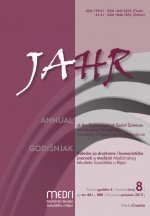Optimalno korištenje energije sa socijalnog aspekta (Osvrt na esej Ivana Illicha Energy and Equity)
Keywords:
granice rasta, transport, brzina, društveno raslojavanje, tehnološka zrelostAbstract
U eseju Energy and Equity Ivan Illich razrađuje tezu da svaki sustav, proces ili ljudska
aktivnost raste ili se odvija do određenog praga nakon kojeg daljnji rast ili daljnje aktivnosti
postaju kontraproduktivne. Illich ilustrira svoju tezu na primjeru transporta. Razvoj tehnike
omogućuje sve veće brzine transportnih sredstava, no ljudi u prosjeku provode više vremena
u transportu nego nekad. Dakle, brzina ne mora nužno značiti uštedu na vremenu. Upravo
je brzina, a s tim povezana i potrošnja energije, ključan čimbenik koji čini transport socijalno
destruktivnim jer izaziva društveno raslojavanje na one koji je mogu i ne mogu priuštiti.
Budući da je stalan rast potrošnje energije nemoguć iz fizičkih, ekoloških i socijalnih razloga,
Ivan Illich vidi budućnost čovječanstva u postindustrijskom društvu tehnološke zrelosti,
oslobođenom obilja i ovisnosti o potrošnji.
Downloads
Published
Issue
Section
License
Authors who publish with this journal agree to the following terms:
- Authors retain copyright and grant the journal right of first publication with the work simultaneously licensed under a Creative Commons Attribution License that allows others to share the work with an acknowledgement of the work's authorship and initial publication in this journal.
- Authors are able to enter into separate, additional contractual arrangements for the non-exclusive distribution of the journal's published version of the work (e.g., post it to an institutional repository or publish it in a book), with an acknowledgement of its initial publication in this journal.
- Authors are permitted and encouraged to post their work online (e.g., in institutional repositories or on their website) prior to and during the submission process, as it can lead to productive exchanges, as well as earlier and greater citation of published work (See The Effect of Open Access).



